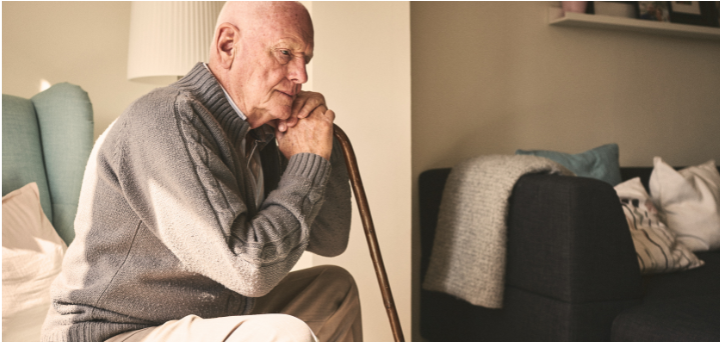Support with post-COVID side effects
Talk to your nurse or GP if you are having post-COVID effects, such as breathlessness, headache, temperature, lethargy or a cough. They will listen to what is happening and do some checks to assess how to help you.
If you have new or persistent symptoms it is crucial that these symptoms are assessed. They might be part of your body’s response to the virus.
If you are experiencing weight loss, coughing up blood, getting chest pain or if any of your symptoms are getting worse speak to your GP or phone 111 urgently.
What will help my recovery?
If you’re breathless
- Using a breathing technique called Breathing control. This helps you to breathe gently with the least amount of effort and can help control your breathing whilst moving around and help recovery after activity.
The NHS has more information on what to do if you get breathless with everyday activities when recovering from COVID-19.
If you’ve still got a cough
A dry cough is one of the most commonly reported symptoms for COVID-19, but some people cough up phlegm.
-
Practise a ‘normal’ breathing pattern – gentle, quiet, diaphragmatic (tummy breathing- feeling the tummy rise and fall as you breathe in and out), nose breathing at rest to start with. Aim to practise this little and often so that it becomes habit. Progress this by practising with gentle activity as you are able.
Other techniques to help with reducing your cough:
- Close your mouth and swallow.
- Gently breathe in and out through your nose, until the urge to cough goes away.
- Sip drinks regularly (hot or cold).
- Suck boiled sweets or lozenges.
Using a combination of the above techniques is more effective at reducing your cough – pick the techniques that work best for you!
It can be very difficult to control your cough but keep practising.
The NHS has more information on how you can control your cough if you’re recovering from COVID-19.
If you smoke
If you smoke, now is a good time to stop. You will see the benefits within 24 hours. Quitting smoking is one of the best ways to protect yourself from viral infections.
Find out how you can get support to stop. You’re around 3 times more likely to stop successfully if you use a combination of stop smoking treatment and specialist help.
If you can’t eat or drink easily
Try to choose a variety of different foods from each of the groups to help you get the wide range of nutrients your body needs to stay healthy.
Your body will need more energy to recover after having had COVID-19, so it’s important to eat well to help you recover. Have a look at the NHS eatwell guide for an interactive guide on eating a balanced diet.
If you have problems swallowing your food, talk to your doctor. They may refer you to a speech and language therapist for a swallowing assessment. The NHS also has information on how COVID-19 can affect your swallowing and what you can do to help yourself.
If you feel exhausted and run out of energy easily
You may be feeling very tired during your COVID-19 recovery, to the point of exhaustion. What you are feeling is called post-viral fatigue syndrome, which is a long period of feeling unwell and very tired after a viral infection.
You might:
- be sleeping more
- feel unsteady on your feet
- not be able to stand for very long
- not be able to concentrate very well
- notice that your memory isn’t as good as it usually is. [7]
What can I do to help my fatigue?
There are plenty of things you can do help your fatigue, including getting yourself into a routine and slowly increasing your activity levels.
For more tips on how to manage post-viral fatigue after having COVID-19, visit the Royal College of Occupational Therapists’ website.
Remember, you can use breathing techniques to help you do things if you get breathless when you’re more active.
The NHS has more information on what you can do about fatigue if you’re recovering from COVID-19.
If you’re ready to be more active
Being ill at home with coronavirus can mean you’re inactive and lose muscle strength, particularly in your legs. At first, you’ll need plenty of rest.
As you begin to feel better, you can start to be a bit more active, but don’t push yourself too hard. Try to do little and often.
You can exercise when you’re in bed. Try moving your legs, circling your ankles and punching your arms up in the air and out in front of you.
If you’re ready, get out of bed and move around for a few minutes. As your symptoms improve and you have more energy, you could gradually increase your activity. However if you are too breathless to speak, slow down until your breathing improves. Try not to not get so breathless that you have to stop immediately, remember to pace your activities.
Start to do your usual daily activities gradually and slowly to strengthen your muscles – and to improve your mental health. This animation from the Chartered Society of Physiotherapy explains what you can expect when you’re recovering form COVID-19.
Speak to your doctor about getting referred to a respiratory physiotherapist or post-COVID rehabilitation about how to exercise as you recover. If you have no long-term conditions, being active will also help with your breathlessness. However, you might find you get out of breath when you’re active – this is not harmful, it’s normal.
As you do more, you may find you get more breathless. This is normal. But activity you can make your breathing muscles stronger, and all your muscles will start to use oxygen more efficiently and your breathlessness will decrease. Learn about how being active affects your breathing.
If you do have a long-term condition, talk to your nurse, GP or physiotherapist to check what level of activity is safe for you.
Trouble sleeping
Problems falling asleep, take a look at these tips from the NHS. Talk to your doctor if these sleep problems persist.
If you’re feeling low or down
As well as your physical symptoms, your mood may also be affected. You are not alone.
Speak to a healthcare professional. You can also refer yourself to NHS services in England, which can offer therapies for anxiety and depression.
The NHS Your Covid Recovery website has advice on:
- managing fear and anxiety
- managing your mood
- coping with fear and frustration
- memory and concentration.
If you feel isolated or lonely you can also contact us. Here at Age UK Cambridgeshire and Peterborough we have various social opportunities for you to enjoy. Give us a call on 0300 666 9860.
Further Information from the NHS

